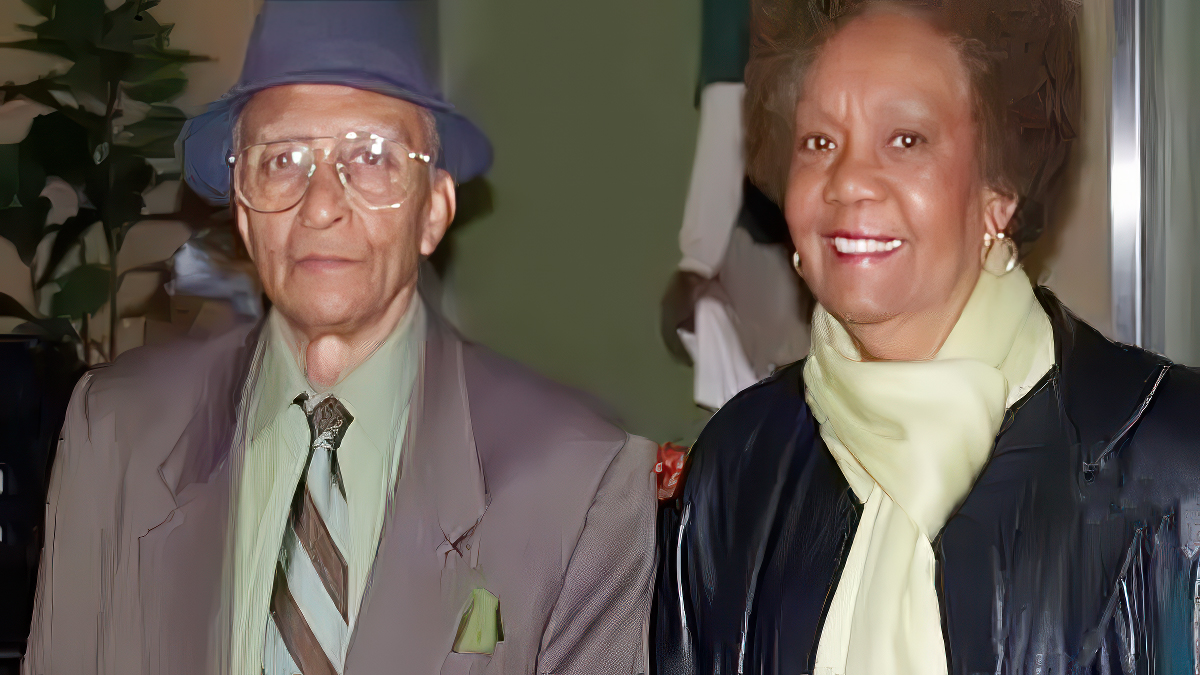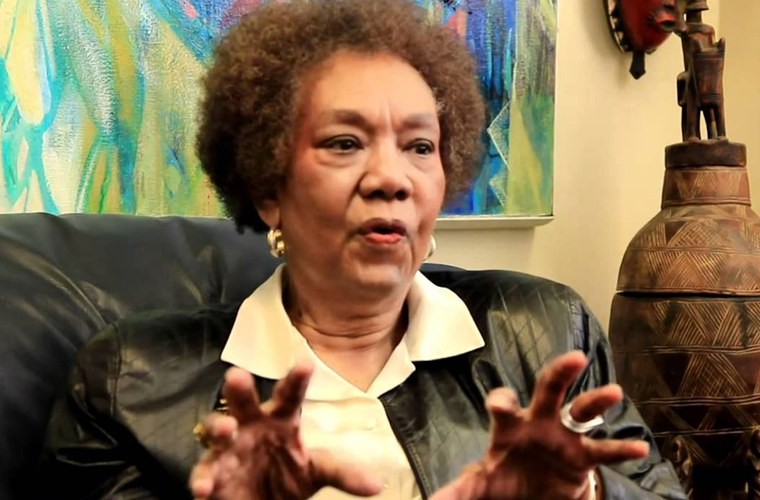The second of three girls, Frances Cress Welsing was born on March 18, 1935, in Chicago, Illinois, into a family that had already produced two doctors. Her father, Henry N. Cress, now deceased, was a medical doctor, as was her grandfather. After receiving her bachelor’s degree at Antioch College in Yellow Springs, Ohio, in 1957, and her M.D. at Washington D.C.’s Howard University College of Medicine five years later, Welsing pursued a career in general and child psychiatry. Her Cress Theory essay was published while she was an assistant professor of pediatrics at the Howard University College of Medicine. According to Welsing, it caused such a stir that her tenure at the university was not renewed in 1975.
In addition to her role as an educator, Welsing spent nearly two and a half decades of her long and distinguished career working as a staff physician for the Department of Human Services in Washington, D.C. and served as the clinical director of two schools there for emotionally troubled children. A specialist in both child and general psychiatry, she began her private practice in the district in 1967 and has gained particular acclaim for her work with young people.
For Welsing, the world’s most pressing problem is the disturbing issue of white supremacy or racism. “I put the discussion of melanin on the board in order to [describe how pigmentation] was a factor in what white supremacy behavior was all about,” Welsing noted in an interview with Michael Eric Dyson for Emerge. “If I had my way, there wouldn’t be all the discussion about melanin. I would say, Discuss white supremacy.”

Welsing laid the foundation for her ongoing discussion of white supremacy in her groundbreaking 1970 essay The Cress Theory of Color-Confrontation and Racism. In it, she reasoned that because whiteness is a color deficiency and white people make up only a small percentage of the earth’s population, they tend to view people of color as a threat to their survival and therefore treat them with hostility. She stated that their defensive reaction has been to impose white supremacy, or racism, on people of color throughout history.
Basing part of her argument on observations by Neeley Fuller in his 1969 Textbook for Victims of White Supremacy, Welsing focused on his view of racism as a “universally operating ‘system’ of white supremacy rule and domination” in which the “majority of the world’s white people participate.” He suggested that economic forms of government such as capitalism and communism were created to perpetuate white domination and that the white “race” is really an “organization” dedicated to maintaining control over the world. In addition, he argued that people of color have never imposed “colored” supremacy on anyone.
Using Fuller’s contention that “most white people hate black people because whites are not black people,” Welsing went on to suggest that “any neurotic drive for superiority,” in this case, the white drive, is based on a “deep and pervading sense of inadequacy and inferiority.” Welsing cited journals, diaries, and books written by whites as examples of their “initial hostility and aggression” towards people of color and particularly towards black people “who have the greatest color potential and therefore are the most envied and the most feared in genetic color competition.” She added: “That whites desire to have colored skin can be seen by anyone at the very first signs of Spring or Summer when they begin to strip off their clothes, often permitting their skins to be burned severely in an attempt to add some color to their white, pale, colorless bodies, rendering themselves vulnerable to skin cancer in the process.”
Psychological Causes and Ramifications of Racism
Welsing asserted in The Cress Theory that many whites are unable to peacefully live among or attend school with people of color because it explodes “the myth of white superiority” and forces them to face their “psychological discomfort” and “color inadequacy.” She also stated that “the difficulty whites have in according to ‘non-whites’ sociopolitical and economic equality stems… from the fundamental sense of their own unequal situation in regards to their numerical inadequacy and color deficiency.” To compensate for this inadequacy, Welsing judged, whites strive to maintain a superior social position and manipulate non-whites and themselves into thinking that they are a worldwide numerical majority instead of the minority. In support of this conclusion, she cited statistics indicating that birth control is rarely emphasized for whites, while a great emphasis is placed on controlling the birth rates of people of color.
She concluded her Cress Theory of Color-Confrontation by arguing that people of color must gain a better understanding of the “behavioral maneuverings” of whites in order to avoid being “manipulated into a subordinated position.” In her view, people of color need to “liberate” themselves psychologically from various forms of white domination. She also suggested that whites need to understand the motivation behind their behavior and explore with an open mind the emotional and psychological foundations of racism.
Published The Isis Papers
The issue of white supremacy is discussed in depth in Welsing’s 1990 book The Isis Papers: The Keys to the Colors, a virtual fixture on the Blackboard African American Bestsellers List. In the book, the author uses America’s preoccupation with sports to illustrate what she perceives to be white supremacist behavior in action: “The whole of white culture,” she wrote in The Isis Papers, “is designed to say that whites have certain qualities. Everything possible is done to demonstrate this. First, you have [only] white players, then blacks come in, but a white has to be the quarterback. Western culture has to protect white supremacy.” Welsing further contended that when blacks succeed athletically, whites are forced “up against the psychological wall” because white youngsters are “brought up to believe a white has to be superior.”
Not surprisingly, Welsing’s views about global white supremacy and racism in contemporary society have provoked controversy and stimulated debate in and outside of the black community, as well as on national television. Her theory has also challenged former definitions of racism put forth by social and behavioral scientists. Despite the controversy surrounding her, Welsing was praised in the Los Angeles Times for being “the first scientist to psychoanalyze white racism” in the history of Western psychiatry, rather than focusing on the victims of racism. She is sought out by the media for her provocative view of race relations and lectures about racism at colleges and universities in the United States and England.

Back in 1974, Welsing debated Dr. William Shockley, the author of a theory of black genetic inferiority, on national public television. She is responsible for generating public discussion throughout the United States about the possible effects of melanin on behavior and culture. Black authors, psychiatrists, and lecturers have written studies and books on this subject, and a series of conferences about it have been held on the East and West Coasts.
In the early 1990s, Welsing’s theory caused a stir in the media after a publicist for the popular rap group Public Enemy sent music reviewers copies of her 1970 essay along with advance tapes of the group’s new album, Fear of a Black Planet. Their publicist, Harry Allen, said in the Washington Post that Welsing’s paper “should be seen as some of the inspiration” for the album, the title song of which deals with racial purity and miscegenation (racial mixing).
In reply to those who have called her theory racist, Welsing commented in the Washington Post that her philosophy is “a challenge to white behavioral scientists to help white people become comfortable with their numbers and their color, because if they become comfortable with their minority and genetic recessive status and stop getting upset about it so they’re really in a posture of respecting themselves, then they can be in a posture to respect other people.”
Still, Welsing drew skeptical comments from some Washington journalists over her reported statement in 1989 on ABC-TV’s Nightline that drug trafficking is an effort by “genetically recessive” whites fearing “genetic annihilation” to kill a large part of the young black male population which poses “the greatest threat to white genetic survival.” Welsing advocated the use of force to stop warring drug dealers in Washington, D.C.’s most dangerous neighborhoods. She also suggested in the Washington Post that more attention should be paid to “what is happening to black men, a large segment of whom are in a state of frustration and hopelessness.” Linking drug-related homicides to personal history, she stated: “I’ll bet if we examined the lives of these drug killers, we’d find a mother who started having babies as a teenager and a kid who had no self-esteem and a fatalistic expectation of a short, violent and jobless life.”
Called for Strong African American Family Structure
Welsing suggested that African American families must operate more effectively if they are to produce “strong-minded” children who can “challenge” white supremacy. In an interview in Essence, she told Karen Halliburton, “No Black female should have children before the age of 30, and no Black man should become a father before the age of 35. Before child rearing, we should be going to school, go to the library, and educate ourselves. We must create mature, mentally developed parents. Then we will be able to produce children with self-respect and a high-level functioning pattern.”
Welsing theorized in the Chicago Tribune that many black children have received too little “lap time” or cuddling from their parents and that this “later propelled them into premature sex, alcohol, and drug abuse.” In private practice and in visits to schools, she observed that these children become parents without learning how to “satisfy emotional needs”; a resulting condition of “dependency deprivation” has perpetuated itself in black families since the days of slavery.
Ultimately Welsing believes that the key to eradicating racism lies in self-respect, discipline, and education. “We must clean up our neighborhoods,” she told Halliburton. “We must revolutionize ourselves… Whether white people are consciously or subconsciously aware of it, they are behaving in a manner to ensure white genetic survival. We must know this truth. And the truth is the first step toward real strength.”

